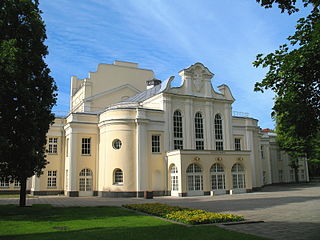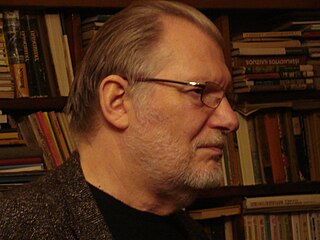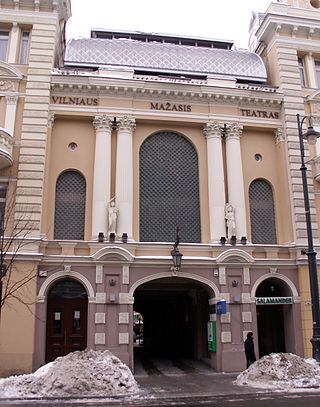
Rasos Cemetery is the oldest and most famous cemetery in the city of Vilnius, Lithuania. It is named after the Rasos district where it is located. It is separated into two parts, the old and the new cemeteries, by a narrow Sukilėliai Street. The total area is 10.8 ha. Since 1990 new burials are allowed only to family graves.

Donatas Banionis was a Soviet and Lithuanian stage and film actor and theatre director. He has more than 80 credited roles in cinema and is best known for his performance in the lead role of Tarkovsky's Solaris as Kris Kelvin. He was born in Kaunas, Lithuania.

Jonas Vaitkus is a Lithuanian theatre and film director, and academic.
Daina Society was a Lithuanian cultural organization promoting Lithuanian folk traditions and songs. It was established as an illegal cultural society by the composer Juozas Naujalis and officially registered with the Tsarist authorities in 1905. Active from 1899 to 1944 in Kaunas, the society organized various events, concerts, amateur theater performances. In 1924, it initiated the first Lithuanian Song Festival.
Juozas Grušas was a Lithuanian writer, editor, dramatist and playwright.

The Kaunas State Musical Theatre, formerly Kaunas City Theatre, is a theatre in Kaunas, Lithuania. It is home to a musical theatre company of the same name, established on 27 November 1940 in the former State Theatre hall on the Laisvės Alėja.

Algimantas Masiulis was a Lithuanian film and theatre actor.
Žilinskas is the masculine form of a Lithuanian family name. Its feminine forms are: Žilinskienė and Žilinskaitė. It is a Lithuanized form of the Polish-language surname Żyliński. Another Lithuanization is Žilinskis. "Žilinskaitė" may be transliterated via Russian language as Zhilinskayte.
Povilas Budrys is a Lithuanian theatre and film actor and artist.
Filomena Linčiūtė-Vaitiekūnienė is a Lithuanian set designer and painter.
Juozas is a Lithuanian masculine given name, a shortened version of Juozapas, which in turn is the equivalent of English Joseph.

Juozas Budraitis is a Lithuanian actor. He has appeared in more than 60 films and television shows since 1966. He starred in the Soviet film Wounded Game, which was entered into the 1977 Cannes Film Festival. Budraitis also played a minor role in the finale of the period drama miniseries The Queen's Gambit.
Stasys Ušinskas was a Lithuanian artist of multiple creative fields: modern painting, stained glass, scenography, animation, puppetry and decorative glass artworks. He is widely regarded as the "father of Lithuanian stained glass art".

Giedrius Antanas Kuprevičius is a Lithuanian composer and music educator.

Rūta Society was a Lithuanian cultural society in Vilnius, then part of the Russian Empire, active from 1909 to the outbreak of World War I in 1914. It organized various events, including lectures, literary evenings, and musical performances, but it is most noted for its contribution to the development of the Lithuanian theater. In total, Rūta staged about 50 plays.

Šiauliai Julius Janonis Gymnasium is a public secondary school in Šiauliai, Lithuania. Established in 1851, it is one of the oldest schools in Lithuania and has educated many prominent figures in Lithuanian culture and politics. It was named in honor of Julius Janonis in 1946 and offers education for grades 9 through 12.

Potencija Pinkauskaitė was a leading character actress of interwar Lithuanian theater, representative of the first generation of professional Lithuanian theater actors.

Antanina Vainiūnaitė-Kubertavičienė was a Lithuanian stage actress. She was recognized as the People's Artist of the Lithuanian SSR in 1956.
Marijampolė Realgymnasium was a private gymnasium in Marijampolė, Lithuania. Established at the end of 1918, it employed many teachers sympathetic to socialist and communist causes. The Communist Party of Lithuania and other communist organizations were outlawed and actively persecuted in interwar Lithuania. The school actively protested and resisted mandatory religious education and clashed with Lithuanian authorities. As such, the school was shut down by the Lithuanian government on 30 June 1925.












